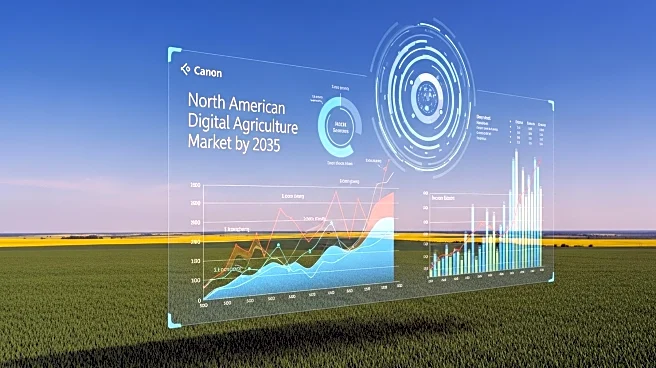What is the story about?
What's Happening?
The North America digital agriculture market is projected to experience substantial growth from 2025 to 2035. This expansion is driven by the increasing adoption of digital tools, smart sensors, AI-driven platforms, and IoT-based solutions, which are transforming traditional farming into more efficient and sustainable practices. Key growth drivers include the rising demand for precision farming, heightened food security concerns, government support for digital agriculture initiatives, and advancements in farm automation. The market is segmented into components such as hardware, software, and services, with applications in crop monitoring, soil analysis, yield prediction, and livestock monitoring. Despite the promising outlook, challenges such as integration costs, data privacy, and the digital divide between small and large farmers remain.
Why It's Important?
The growth of the digital agriculture market in North America is crucial for enhancing the efficiency and sustainability of farming practices. As the sector evolves, it promises to address food security concerns and improve productivity through precision farming techniques. This transformation is likely to benefit agritech companies, investors, policymakers, and farming communities by providing new opportunities for innovation and collaboration. However, the challenges of integration costs and data privacy need to be addressed to ensure equitable access to these technologies across different scales of farming operations.
What's Next?
The market is expected to see increased investment in smart farming platforms across the U.S. and Canada, along with the expansion of cloud-based precision farming tools to enhance scalability. Collaborations between agritech firms and research institutes are anticipated to address food production challenges, further driving the adoption of digital agriculture solutions. Stakeholders will need to focus on overcoming integration and privacy issues to fully realize the potential of these technologies.
Beyond the Headlines
The shift towards digital agriculture represents a broader trend of integrating technology into traditional industries, highlighting the importance of innovation in addressing global challenges such as food security and environmental sustainability. The ethical implications of data privacy and the digital divide must be considered to ensure that technological advancements benefit all farmers equally.
















